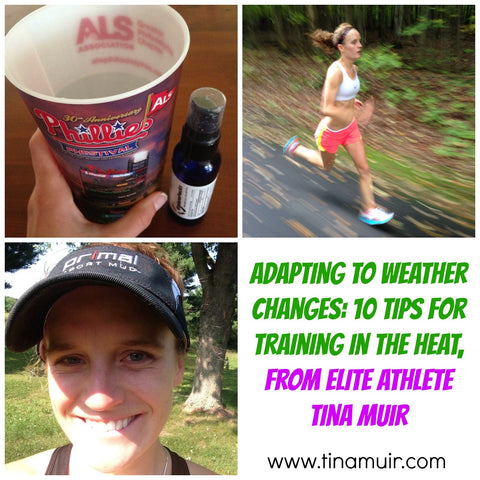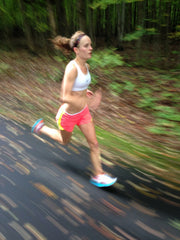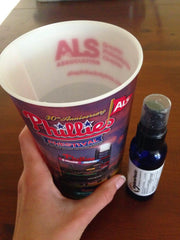10 Tips To Help Training In HEAT, From Elite Runner Tina Muir
The following is a repost from elite runner and Saucony Hurricanes racing member, Tina Muir. You can find more informative blogs for runners and endurance athletes from Tina by visiting her site at www.tinamuir.com.
It is that time of year; the temperatures are high and there is a very short window early in the morning before the heat soars. This can make running somewhat difficult, as the sun beaming down on your head and the heat waves wiggling on the asphalt; make you feel like an egg on a frying pan. Or is that just me?
A study that analyzed over 1.7 million people in marathons all over the world over the course of 10 years, found that air temperature had the biggest impact on running performance. There was a significant correlation of high temperatures with a decrease in performance in each of the 60 races analyzed.
This graph shows the difference in performances as a whole for Chicago marathon in 2002 and 2007, where temperatures were 5.4 °C (41.7°F) and 25°C (77°F) respectively. Paris temperatures in 2002 also show the impact of temperature as temperatures were 7.6°C (45.6°F) and 17.4°C (63.6°F).
You can clearly see that in 2007, when temperatures were higher, performances were impacted.
However, this time of year, it can be impossible to avoid the heat, especially on long runs, and race start times are set. What can be done to prepare for training in the heat? Here is my advice on how to handle running in the summer.
Be smart about time of day
If possible, try to run/workout before the sun fully rises in the morning, or later in the evening as the sun is setting, to avoid the sun beating down on your head. If you have a long run, be sure to start early so you only have a short amount of time in the heat.
I try to run in the heat of the day once per week as preparation for races that are on exceptionally hot days, but all my other runs are done early in the morning.
Stay in the shade as much as possible

Avoid running on black top surfaces
When the sun is out, asphalt and other black surfaces will reflect the heat back up, making it even hotter. Try to stay on lighter colored surfaces, or grass as much as possible.
This is also a great opportunity to give your body a break from the pounding of hard surfaces.
Use the correct accessories
Wear a hat to keep the sun off your face, again keeping you cooler, and providing a psychological boost.
It is also important to protect your eyes by wearing sunglasses often. Especially when it is a clear day and there are plenty of reflective surfaces around the city/town.
Dress appropriately
 This means wearing loose fitting, sweat wicking fabrics, that will pull the sweat from your body and onto the material. This will keep your body temperature down as it helps the effectiveness of sweating for cooling your body down.
This means wearing loose fitting, sweat wicking fabrics, that will pull the sweat from your body and onto the material. This will keep your body temperature down as it helps the effectiveness of sweating for cooling your body down.
Some people also believe it is better to wear a T-shirt in warm weather to take the sweat off your skin as it cannot evaporate fast enough.
Reduce warm up time for workouts/races
Your muscles will warm up much faster as the temperature rises, which may reduce the amount of time you want to spend running beforehand to prevent overheating.
Slow down
Accept that running/training in the heat is much more strenuous on your body, as its priority is to keep your internal body temperature constant, therefore your performance becomes secondary. You will likely feel as though you are working much harder to run a slower pace, that is okay, everyone else is in the same position.
Even if you have multiple workouts in the heat, you will not lose fitness because once the temperature does drop, your body will be much more efficient. Think of all those fall races where you will be able to fly!
Place ice cubes/cooling packs on your wrists and the back of your neck
This helps to lower your body temperature prior to a race/workout. This is only temporary, but can relieve some of the psychological stress heat brings.
I actually used this one when I raced in Texas, and found it was very helpful.
Use water cups for more than just drinking
If you are in a longer race where you have access to water cups, drink as much as you can, and dump the rest over your head. You guessed it....this helps reduce your body temperature, and feels very refreshing!
Rehydrate rehydrate, rehydrate

Also in Blog

The Impact Of Dehydration On Performance
Dehydration Results In Lower Blood Pressure And Slows Bodily Processes. Active individuals should be aware of the acute effects of dehydration on performance. With just a 2% loss of water in the body, heat regulation becomes impacted. With a 3% drop in body weight from water loss, muscle cell contraction is impacted. And at 4% loss, there is 5-10% reduction in overall performance that can last up to 4 hours.

How To Survive The Heat and Humidity

Dropping Unnecessary Sugars In Your Sports Drink Is Easy
We need to hydrate. But how can you hydrate and replace electrolytes without the harmful additives like sweeteners and artificial flavoring common in sports drinks that are harsh on your stomach?
